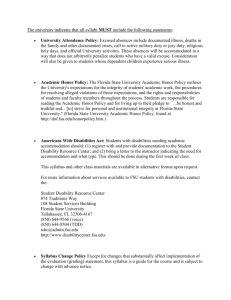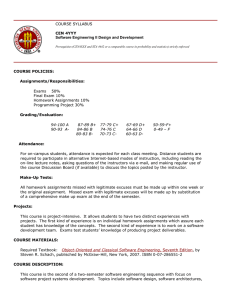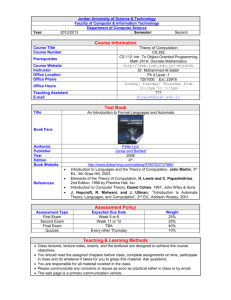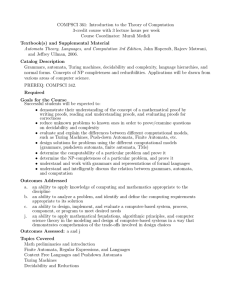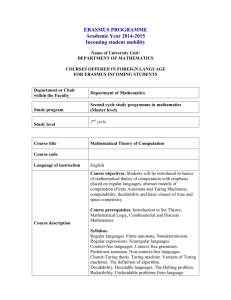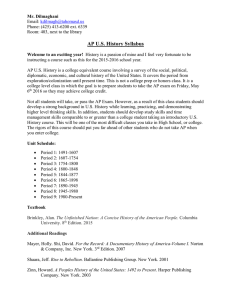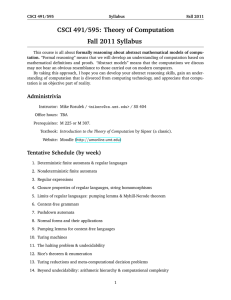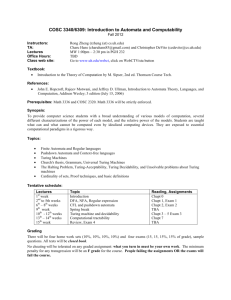Course Objective:
advertisement
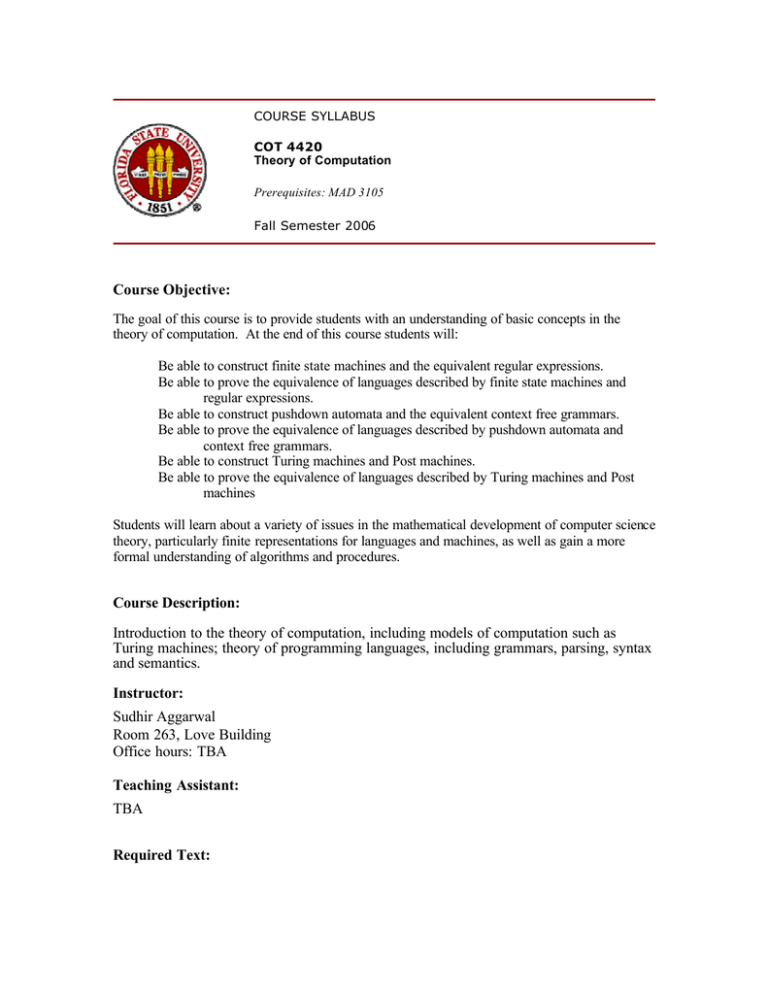
COURSE SYLLABUS COT 4420 Theory of Computation Prerequisites: MAD 3105 Fall Semester 2006 Course Objective: The goal of this course is to provide students with an understanding of basic concepts in the theory of computation. At the end of this course students will: Be able to construct finite state machines and the equivalent regular expressions. Be able to prove the equivalence of languages described by finite state machines and regular expressions. Be able to construct pushdown automata and the equivalent context free grammars. Be able to prove the equivalence of languages described by pushdown automata and context free grammars. Be able to construct Turing machines and Post machines. Be able to prove the equivalence of languages described by Turing machines and Post machines Students will learn about a variety of issues in the mathematical development of computer science theory, particularly finite representations for languages and machines, as well as gain a more formal understanding of algorithms and procedures. Course Description: Introduction to the theory of computation, including models of computation such as Turing machines; theory of programming languages, including grammars, parsing, syntax and semantics. Instructor: Sudhir Aggarwal Room 263, Love Building Office hours: TBA Teaching Assistant: TBA Required Text: 1. [Lin2001] Peter Linz, An Introduction to Formal Languages and Automata, Third Edition, Jones and Bartlett, 2001. (required). Class Schedule: Lectures Mondays and Wednesdays 3:35 pm – 4:50 pm Love 301 Lecture Notes and Information Week # Meeting Days 1 August 28, 2005 August 30, 2005 2 September 4, 2005 September 6, 2005 Reading Assignments & Information Read Chapter 1 Labor Day, No classes Read chapter 11, section 1. Read lecture notes 2 3 September 11, 2005 September 13, 2005 4 September 18, 2005 September 20, 2005 Read lecture notes 2 5 September 25, 2005 September 27, 2005 6 October 2, 2005 October 4, 2005 7 October 9, 2005 October 11, 2005 Read Chapter 2 Start reading Lecture notes 3 Read Chapter 3.1 Read Lecture note 3 through page 50 Read Chapter 3.2 and 3.3 Exam 1 October 9, 2005 8 October 16, 2005 October 18, 2005 9 October 23, 2005 October 25, 2005 10 October 30, 2005 Review Chapter 3 Read Chapter 4.1 and 4.2 Read Chapter 4.3 Read Chapter 5 Class Notes & Homework Assignments Notes handed out in class Lecture1-overview Homework 1: due September 13, 2005 Lecture2-finite-statemachines Homework 2: due September 27, 2005 Lecture3-acceptors Homework 3: due October 11, 2005 Lecture4-propertiesregular-languages Homework 4: Due October 30, 2005 You may need to wait until Monday’s lecture to start some of the problems in this set Lecture5-context-freegrammars-languages Homework 5: Due November 1, 2005 11 November 6, 2005 November 8, 2005 12 November 13, 2005 November 14, 2005 13 November 20, 2005 November 22, 2005 14 November 27, 2005 November 29, 2005 15 December 4, 2005 December 6, 2005 16 December 11-15, 2005 Guest Lecture: Piyush Kumar Review Exam 2 November 8, 2005 Read Chapter 6 November 6, 2005 Read Chapter 7 FINAL EXAM WEEK Exam 3 Grading: 1. There will be three tests (20%, 25%, 30%, respectively). 2. There will be about 7 problem sets during the semester (25%). It is very important to complete all problem sets. You may talk to me, the teaching assistant, or other students to help you get started on a problem, but you must do the problems by yourself. 3. The first test will be on October 9. The second test will be on November 8. The third test will be in December, during finals week. Tests may include materials covered in earlier tests. Attendance: Attendance at all lectures and recitations is required, and will be monitored. Each unexcused absence in excess of three will result in a one point deduction from your final average. Missed Exams/Late Assignments: Students will not be allowed to make up a missed exam due to an unexcused absence. Unexcused late assignments will receive a 25% per day (or part thereof) penalty. COURSE POLICIES: ACADEMIC HONOR CODE: Students are expected to uphold the Academic Honor Code published in The Florida State University Bulletin and the Student Handbook. The Academic Honor System of The Florida State University is based on the premise that each student has the responsibility (1) to uphold the highest standards of academic integrity in the student's own work, (2) to refuse to tolerate violations of academic integrity in the university community, and (3) to foster a high sense of integrity and social responsibility on the part of the university community. Please see the following web sites for a complete explanation of the Academic Honor Code. http://www.fsu.edu/Books/StudentHandbook/codes/honor.html http://www.fsu.edu/Books/Student-Handbook/ AMERICANS WITH DISABILITIES ACT: Students with disabilities needing academic accommodation should: (1) register with and provide documentation to the Student Disability Resource Center; (2) bring a letter to the instructor indicating the need for accommodation and what type. This should be done during the first week of class. Please see the following web sites for more information. SDRC@admin.fsu.edu http://www.fsu.edu/~staffair/dean/StudentDisabi lity/ This syllabus and other class materials are available in alternative format upon request. SYLLABUS CHANGE POLICY: This syllabus is a guide for the course and is subject to change
